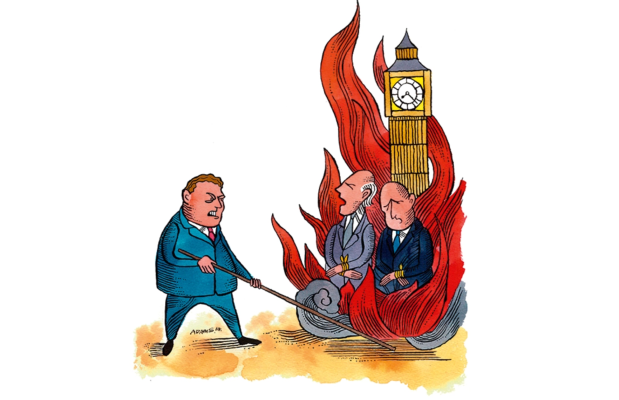An instinctive Tory faith
Sir: For once Bruce Anderson does not exaggerate: David Cameron did indeed win golden opinions for his ‘high intellect and low cunning’ at the 1992 election (‘The boy David’, 25 April), putting him among the most brilliant products of the Conservative Research Department over its long history. He contributed magnificently to the widely praised briefing material that the department produced for Tory candidates, in particular its 350-page Campaign Guide (a publication now discontinued after appearing at elections for 120 years, despite Cameron’s own boast that this is the ‘most organised’ campaign in his career).
But there was more. Thanks to Bruce and others, no one in the place understood more clearly that the supreme object of the Conservative party is the preservation of the nation. What has happened to this instinctive Tory faith? If he had proclaimed it eloquently and vigorously to the country last year, Scottish separatism could have been resoundingly defeated at the referendum. By placing undue emphasis on the narrow interests of England without any long-term constitutional plan to bind the entire nation together, the Tory campaign at this election is in danger of contributing to the further weakening of the Union, a prospect that it should be determined at all costs to avoid.
Alistair Lexden
Deputy Director, Conservative Research Department, 1985–1997
House of Lords, London SW1
A debt to Raymond Carr
Sir: Following on Nick Mosley’s fine encomium on Raymond Carr, may I add my own note of gratitude (‘Remembering Raymond’, 25 April)? Back in 1969, I had discovered how difficult it was for young historians and biographers to get a first foot on the ladder. Having had a modest financial success from royalties on my book The Price of Glory, I wanted to help.
Only Raymond Carr stepped forward. With his vision, support from the Ford Foundation, and the backing of St Antony’s College, the ‘Alistair Horne Fellowship’ was launched. Now in its fifth decade, it has been — without boasting — an outstanding success, helping some 40 first-time authors including Norman Davies, John Campbell, Ian Buruma and Daisy Hay; also now Maurice Walsh, just reviewed (in your issue of 25 April) by another former fellow, Roy Foster. It thrives, but without Raymond it would never have got off the ground. In the hundreds of book reviews he wrote for this and other journals, Raymond applied a special tenet. Never claiming to be a kindly person, he declared: ‘If some poor sod spends all this time writing a bloody book, you must find something good to say about it.’ He seldom strayed from this precept; perhaps a great moral for all of us.
Sir Alistair Horne
Henley-on-Thames, Oxfordshire
The fox and the hair
Sir: Reading Lara Prendergast’s article on hair in last week’s issue (‘The roots of the matter’, 25 April), reminded me of my recent visit to the hairdresser. Noticing the huge pile of cuttings on the floor I asked her what happened to the hair. She told me that the long hair was sold for hair extensions but she usually bagged up the rest as waste. I wondered if there was an untapped market for these cuttings and she said that occasionally a man calls and takes it. He keeps chickens and apparently it keeps the foxes away. I don’t know what he does with it but, given his ongoing problem with these pests, Alexander Chancellor might like to investigate this solution.
Ray Boyd
Corby, Northants
Selling off parsonages
Sir: Donald Peacock (Letters, 18 April) might have said that the presence of the rectory or vicarage in the village is ‘still the best recruiting aid the Church has’, even more than the vicar. The traditional parsonage beside the church, as a venue for meetings, fetes and other parish events, has always been the symbol of Church in community, and our evidence shows that the loss of these fine houses has equally led to declining congregations that have to give ever more in parish contribution to keep the bureaucrats going.
Well over 8,000 fine parsonages have been sold off since 1945. A rough calculation shows that, at a conservative present value of £1 million per house sold, these would now be worth £8 billion. Even if genuinely redundant for clergy use, their present income, if they had been kept and rented out, would be enough to fund the entire annual stipends of the current clergy and more besides. What a story of waste.
Anthony Jennings
Director, Save our Parsonages, London WC1
Party like an octogenarian
Sir: Toby Young reveals that his pa fathered a child at the age of 80 (25 April). The octogenarian Dame Joan Collins recounts how she ‘hit the disco’ and partied for 48 hours following her Buckingham Palace investiture. And now here’s Taki plotting his 80th birthday bash. Wits about you, female editors and young fillies, this will be one helluva High Life revelry.
Will Holt
Enochdhu, Perthshire
Other genocides
Sir: Your correspondent Nick Ridout says that Germany was ‘the only nation to have committed genocide twice within half a century’ (Letters, 25 April). There are two more. Stalin’s murders (including starvation) of the kulaks in Ukraine in the 1930s, were followed by the murders, at Katyn and elsewhere, of Polish officers and the intelligentsia in 1939–41 and, arguably, of numerous Russian ex-prisoners of war and Polish resistance fighters in 1945 and later. Secondly, there were the killings of millions of Chinese in the ‘cultural revolution’ in the 1950s and 1960s by Mao Tse Tung and by his acolytes such as Pol Pot in the killing fields of Cambodia. It was the Vietnamese who liberated Cambodia, not the Chinese, and it is the latter who support the murderous North Korean regime today.
C.J.W. Minter
London SW6
Got something to add? Join the discussion and comment below.
Get 10 issues for just $10
Subscribe to The Spectator Australia today for the next 10 magazine issues, plus full online access, for just $10.
You might disagree with half of it, but you’ll enjoy reading all of it. Try your first month for free, then just $2 a week for the remainder of your first year.













Comments
Don't miss out
Join the conversation with other Spectator Australia readers. Subscribe to leave a comment.
SUBSCRIBEAlready a subscriber? Log in